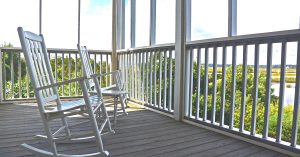“Statute of Limitations Can Prevent Enforcement” – News-Press

A: It depends on several factors, primarily whether the patios are part of the “lot” or are on common areas of the community. In general, the statute of limitations for enforcement of restrictive covenants (I am assuming the screening violates a restrictive covenant) is 5 years, so that would seem to be a major issue.
If the patios were added to common areas, different principles may apply since this property is typically owned by the association. The most common approach to these kinds of situations is for the board, with the assistance of legal counsel, to “grandfather” existing violations and provide the members of the association notice that the restriction will be enforced on a prospective basis. This usually helps cut off defenses of selective enforcement and waiver.
Entering onto another’s property (if that is what is involved) to enforce a covenant is known as “self-help,” which is generally not favored in the law. There are case precedents upholding this remedy if authorized by the governing documents, but it should be considered carefully and in close consultation with legal counsel.
Q: Are access control personnel at our main entry gate permitted to make copies of driver’s licenses belonging to those entering our community? (S.D., via e-mail)
A: Yes, access control personnel are permitted to make a photocopy of the license for the operator of a motor vehicle entering a community. Section 322.143(2) of the Florida Statutes, only prohibits private entities from “swiping” driver’s licenses which could capture personal information from the magnetic strip or bar code.
Q: Must my condominium association hold an election every year? Our bylaws require an annual election meeting on or by the second week in November, but I have never seen an election at my condominium. (Z.A., via e-mail)
A: Section 718.112 of the Florida Condominium Act provides that an annual meeting of the unit owners must be held at the location provided in the association bylaws, and if the bylaws are silent as to the location, the meeting must be held within 45 miles of the condominium property. The law also provides that vacancies on the board caused by the expiration of a director’s term must be filled by electing a new board member at the annual meeting, and the election must be by secret ballot.
However, no election is required if the number of vacancies equals or exceeds the number of candidates. Therefore, while your association is required to hold an annual meeting every year, it is not required to hold an election unless there are more candidates for the board than there are open seats.
Q: A board member of our condominium association has purchased units at foreclosure sales. It was my understanding that board members are not permitted to purchase units in this manner. Is that correct? (G.R., via e-mail)
A: Section 718.111(9) of the Florida Condominium Act was amended in 2017 to provide that a board member, manager, or management company may not purchase a unit at a foreclosure sale resulting from the association’s foreclosure of its lien for unpaid assessments, nor take title by deed in lieu of foreclosure.
However, if a board member is purchasing units from any other sale, including a sale that resulted from foreclosure of a mortgage, or a tax deed sale, there is no similar prohibition in the law. Some condominium associations also limit the number of units that any one person or entity can own, which has been held to be legally permissible under certain circumstances. Such a restriction could also serve as a limitation on the board member’s right to purchase units.
Joseph Adams is an attorney with Becker & Poliakoff, P.A., Fort Myers. Send questions to jadams@beckerlawyers.com. Past editions may be viewed at floridacondohoalawblog.com.





